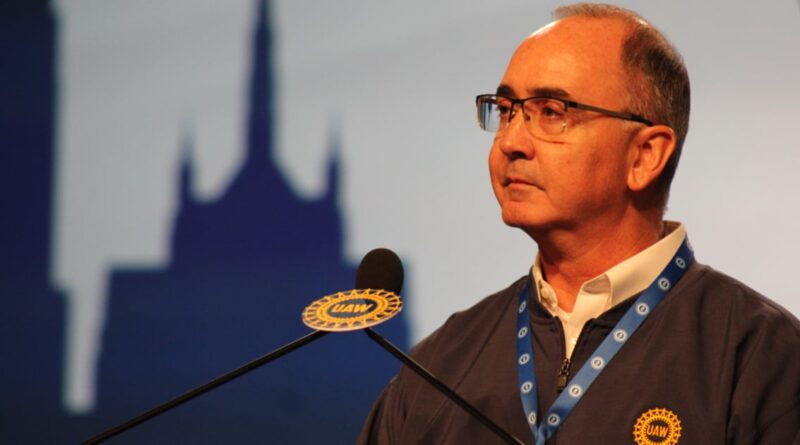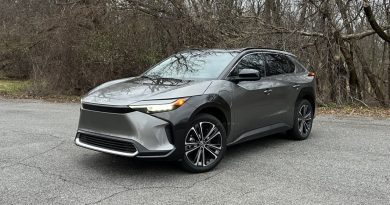UAW eyes Belvidere plant as it plans upcoming negotiations
UAW President Shawn Fain on Friday said the union’s relationship with Stellantis has been “fractured” by the company’s decision to indefinitely idle its Belvidere Assembly Plant in Illinois, with the future of the facility a likely flashpoint in upcoming contract negotiations.
“When the CEO of the company can fly over here and go to our plants and threaten our members about future product and absenteeism but can’t take the time to reach out to us and have discussions with us, that’s a problem,” Fain said in an virtual interview with the Automotive Press Association in Detroit. “Meanwhile, we have plant closing moratoriums in our contracts; it’s a flat-out black and white violation, what they’re doing right now. When they take actions like that that hurt our members, things aren’t going to be good.”
Fain said he has not met with Stellantis CEO Carlos Tavares but has delivered stern warnings to other company executives. He stopped short, however, of saying the union would automatically strike the company if the plant was not reopened.
“It’s unacceptable, what they’ve done there,” he said. “We expect things there to change.”
Stellantis declined to comment.
Fain, who was sworn in as the union’s fifth president in as many years last month, has indicated he intends to take a more aggressive tone with the Detroit 3 in contract negotiations later this year. He said Friday the companies must better prioritize union workers.
“I sat the other day with some corporate leaders that want to talk about how they respect our workers,” he said. “Well, don’t talk to me about respect when you’re making billions of dollars in profits for a decade and you’re closing plants, not because of a lack of work, not because of hard times, because you’re just choosing to chase something else and the members aren’t a priority. That’s not respecting people.”
The U.S. auto market continues to recover from the pandemic and microchip shortage, though it remains well below its highs before COVID-19 disrupted sales, while rising interest rates and new-vehicle prices have sidelined some buyers. And industry profits remain robust, though price cuts are spreading among EV makers.
Detroit automakers, preparing for a possible downturn, have also trimmed white-collar ranks in recent months through buyouts or layoffs.
The union plans to fight for higher wages, better benefits and more job security as the industry transitions to EVs. Fain said it must win back concessions made during the Great Recession.
“Our members and our retirees made a lot of sacrifices during the bankruptcies, unfairly, and when things go bad, we make sacrifices,” he said. “But when things pick up, it should be equitable as we move forward. It hasn’t been. There’s been over a decade of high profits and we’ve seen things get better for the companies. On the back end, things like cost of living adjustments and job security language were suspended — not eliminated— and we’re still sitting without those things.”
Fain said “everything’s on the table this fall” during negotiations and that “we’re going to take a different approach to everything we’re doing.” He has previously indicated he’d be open to signing longer or shorter contracts than the standard four-year pacts in effect.
A key issue, both in the immediate future and during negotiations, Fain said, will be ensuring future electric vehicle battery production is done with union labor. So far, automakers like Ford and General Motors have set up nonunion joint ventures with supplier partners that are not automatically covered by the UAW’s national contracts, although workers are free to organize those sites.
“Joint ventures for technology are one thing, joint ventures to escape your commitment to our members and our contracts is another,” Fain said. “They’re going to claim these joint ventures are strictly about technology, but if that were the case, they would have worked with us, but they didn’t.”
Fain said the union is determined to ensure jobs at battery joint ventures have better wages and more commitments from automakers around job security.
“This is our future,” Fain said. “If we don’t rein this transition in … we’re already behind, where it is right now. The status quo is not going to work for our members.”
Fain, 54, will serve a four-year term after winning the presidency in the union’s first-ever direct election of officers. He said he intends to run again when his first term concludes to be a stabilizing force after years of turnover among top leaders.
“I didn’t do this for a four-year turnaround,” he said. “I’m doing this for the long haul to really get this union back on course and get us back to a union that our members believe in and that our communities respect.”
Source : Autonews.com




